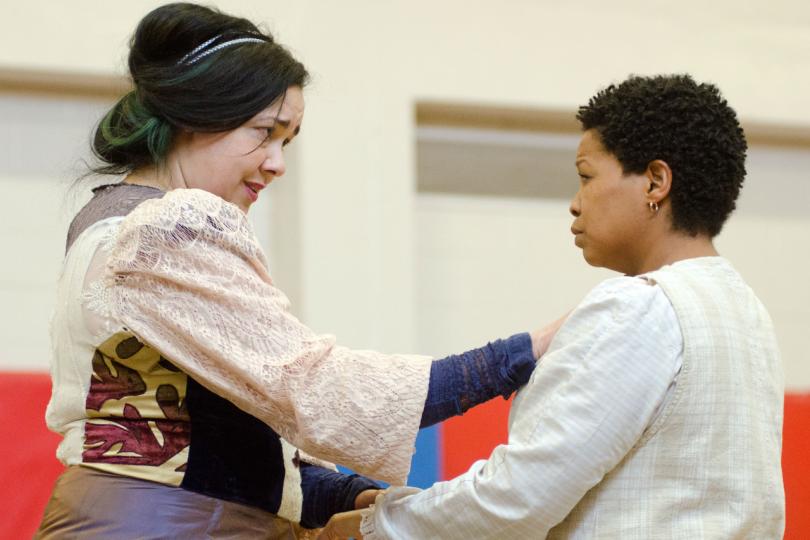Intimate Apparel, Exquisitely Stripped Down

There was an audible groan in the second act. Not from a bad pun or physical pain, but because a sweet, hardworking woman was about to do something blisteringly naïve and all of hearts had broken for her. Esther Wells, the seamstress at the heart of Lynn Nottage’s sensitive play Intimate Apparel, goes on a passionate, difficult journey and the production ensures that the audience is by her side at every step.
I had never gotten the chance to see a show by Ten Thousand Things Theater Company, but was familiar with their mission of bringing quality shows to non-traditional audiences. The shows are performed in full light in the round with minimal sets. Their productions are agile and flexible, able to be performed in correctional facilities, homeless shelters, and, in this case, the lecture room at Open Book in downtown Minneapolis. Without the technical trappings of conventional theater, the text and the actors shine.
The play follows Esther Wells (a luminous Aimee K. Bryant), a talented black seamstress at the turn of the twentieth century in New York who sews intimate apparel for wealthy white women and prostitutes alike. But, while her skill has made her successful, it has also left her lonely. When she starts receiving passionate letters from a man named George Armstrong (a smooth Darius Dotch) working on the Panama Canal, it seems that romance and the respectability of married life may finally be within her reach. But, is it what Esther really wants.
The chemistry between the cast is spectacular. Aimee K Bryant is easy to love as Esther. She is warm and principled and so, so vulnerable. You can see why so many people care so deeply about her, from her busy-body landlady, played with warmth and moxie by George Keller, to her clients and friends. As privileged, frivolous, and deeply unhappy Mrs. Van Buren, Karen Wiese-Thompson clings to every scrap of intimacy she can get from the careful seamstress. But, the boundaries of race and class cast a shadow on their relationship, and we see Esther delicately navigate the power structures at play. When Mrs. Van Buren offhandedly remarks that Esther should take her to a “colored show,” Esther retorts that Mrs. Van Buren should take her to the opera instead. “I would! It’d be so scandalous!” Mrs. Van Buren trills.
The calculus of these scenes is contrasted with the easy friendship she shares with Mayme (a vivacious Dame-Jasmine Hughes). Seeing these two black women so at home with one another and themselves was like a breath of fresh air. Their bluesy improvised song felt so genuine and affectionate. I really appreciated how the script navigated the twists and turns of their relationship, and the respect that it gave to their closeness.
I was impressed with the transformations of Stephen Mohring’s clever, utilitarian set, but I was always excited when the railing flipped up because it meant we were going to Mr. Marks’ store. The connection between the shy Jewish shop keeper and the kind seamstress was pure and electric. Kris Nelson brought a delicate, nervous, joy to their interactions. It’s like they are the only ones who can truly see one another, and watching them wax rhapsodic about the craftsmanship of the fabrics was delightful. They cannot touch one another per his religion, but there’s a tender electricity to the way they handle silk together. When Mr. Marks learns that Esther is getting married, he allows himself only a brief instant of heartbreak, and it’s perhaps one of the saddest moments I’ve seen onstage.
The sweetness and the sadness of Nottage’s script are deftly orchestrated by director Austene Van. Every character is clearly drawn and well developed. There are no easy villains, no one untouched by the oppressive forces around them. Even when things get crushingly sad, a glimmer of some sort of hope shines through. Our heart soars with Esther’s, and breaks alongside hers as well.
Every design choice serves the story. Trevor Bowen’s costumes quickly establish status and character. Esther is dressed in colorless, practical clothing, mirrored by the all-white outfit of the fantasy George Armstrong. Vibrant colors invade her world through the multicolored letters from her Panama man and the sumptuous bolts of fabric she and Mr. Marks share. Annie Enneking brings a lot to the production with music, from the jaunty ragtime of the party downstairs against Esther’s hymns, to the magical sweep of windchimes that heralded the letters of her Panama man.
According to the program notes, Nottage, who recently won her second Pulitzer Prize, is working on adapting this script into an opera. This may seem odd for what is essentially one woman’s small story. But, the depth and breadth of feelings we experience with Esther could fill arias. The compassion and insight Nottage brings to these characters makes the story rich and challenging, and Ten Thousand Things honors the text with a beautiful production. I felt so fortunate to be a part of the story, even as my heart broke.




